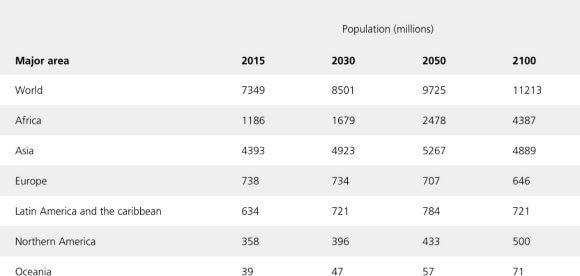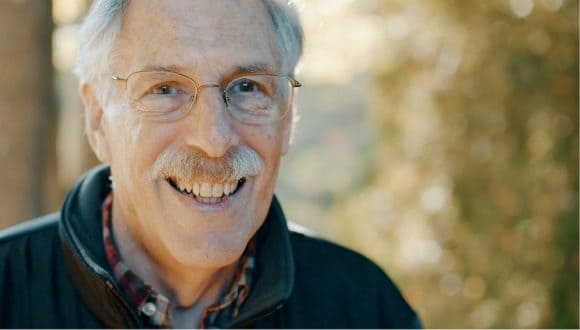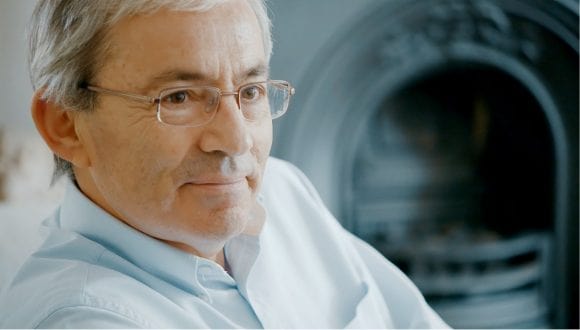His mother wanted him to be a doctor but William Sharpe couldn’t stand the sight of blood. Since education was a family tradition, he decided to become a different kind of doctor. In doing so, he became a leader in an academic field of his own making: financial economics.
Along with his co-laureates Harry Markowitz and Merton Miller, Sharpe is said to be the master of investment. He developed the Capital Asset Pricing Model (CAPM), the first theory to explain why securities have the prices they do and how prices or returns differ from one another. As a passionate and self-taught programmer, he's also created analytical tools that have radically changed financial markets.

William F. Sharpe
The Sveriges Riksbank Prize in Economic Sciences in Memory of Alfred Nobel, 1990
At a glance
At a glance
Born: 1934, Boston, Massachusetts, USA
Field: Financial economics
Prize-winning work: The general theory for the pricing of financial assets, pioneering contribution to the field of financial economics
Earlier professions: Wedding and sports photographer, assistant at gas station
Fears: Blood
Passions: Sailing, opera, dogs, programming, playing piano
Milk, butter and the Capital Asset Pricing Model
Milk, butter and the Capital Asset Pricing Model
Sharpe’s reputation as a giant in the financial world aside, he's also worked to make economics useful to all parts of society, especially to those less fortunate.
If the average person wonders why milk is more expensive than butter or why the price of milk rises but butter remains the same, you could tell them it’s dependent on the market price of fish. Sharpe analyzed and proved how a shift in one market drives the prices of others. This would become the for the CAPM and single-index model and in 1961, it was ground breaking.
Did a theory define our financial markets?
Did a theory define our financial markets?
The CAPM isn't simply a model to be used in grocery stores, it has contributed to the analysis of financial markets and the reason why the Nobel Committee called his work “the backbone of financial economics.”
“In equilibrium there are a set of portfolios that are efficient, better than others,” explains Sharpe. “Those portfolios typically involve a combination of what we now call the market portfolio. A broad portfolio including, in principal, all the available securities in proportion to their market values.”
“The best thing to do is to put some or all of your money in that portfolio and the rest or none into something safe like treasury bonds, bills, treasury inflation-protected securities,” he continues. “If you really want to take on risk and get a higher expected return, you might even want to borrow money and invest it all in that market portfolio. The trade-off between expected return and risk will be roughly linear, so if you want more expected return, you’re going to have to take more risk.”
What’s the theory that defined our financial system?
“Bill, following Harry Markowitz, developed the first theory of why securities had the prices they had, and later turned that theory into a general equilibrium,” says Martin Gruber, a professor at New York University’s Stern School of Business. “It's the first theory that explained why and how the prices or returns on securities differ from each other. It changed the whole way the industry works.”
Why Sharpe’s work has been a revolution
Can software help us avoid poverty in old age?
Can software help us avoid poverty in old age?
Flattery like this may come with being a Nobel Laureate, but it doesn't keep him from the grindstone. In his home office, with its little piano and numerous paintings of his beloved dogs, the retiree is still reaching new heights. Today he is an ace at programming, and while his tools may not have changed, the topics have.
How do we stop old-age poverty?
For nearly two years, Sharpe worked on strategies to produce income during retirement by factoring in thousands of possible future scenarios, market information, market equilibrium and other circumstances to assess and evaluate different financial security options for individuals. Of course, this strategy also comes with a software suite he's programmed.
“Many people put their retirement savings in vehicles that are riskier than they understand them to be,” he says. “It costs more in terms of expenses, going to insurance companies, going to investment managers than is necessary.”
How can we make financial markets work for everyone?
How can we make financial markets work for everyone?
This kind of work isn't new for Sharpe. Many years ago, he left academia to consultant within the private sector. As the founder of William Sharpe Associates, he's been able to combine his research with real world problems more effectively. It's also allowed him to maintain a better role in advising those who are less fortunate or who have been tasked with managing a pension or endowment fund.
How to take responsibility for ordinary people
Has this question inspired you?
Get the latest Nobel perspectives delivered to you.
“I’m concerned mostly with people who earn middle or lower incomes,” he says. “Although obviously the lower income people generally don’t have much money to invest.”
“Many of these new securities are popular primarily for people who are making bets and in terms of making people better off, improving the welfare of ordinary investors, I find many, many of these to be superfluous if not dangerous.”
How can we shape our future retirement plans?
How can we shape our future retirement plans?
Thinking about future generations is a top priority for Sharpe and he doesn’t think the current retirement system will work forever.
How the young must provide for retirement
“It’s very simple to say you got to work longer and save more,” he says. In his opinion, financial education is an important step for younger people, especially when planning for retirement. “We really need to have education possibly at many levels that will help people get the rudiments, not just 'Watch out for the credit card fees' or the usual simple consumer things.”
A simple change in education, he thinks, can lead to deeper understanding of daily issues.
During the summer months, Sharpe teaches kids how to program using a language called Scratch. “It’s a marvelous language for being creative and learning all these kinds of habits of logical thinking,” he says. “I’ve been teaching that partly just to see if it makes sense to argue that this should be done, and after four years of doing this, I feel more strongly than ever that it can be taught. It should be taught.”
Is migration the master plan for aging societies?
Is migration the master plan for aging societies?

As a keen sailor, he knows that it's not how the wind blows, but how you set the sails. The Nobel Laureate strongly condemns the rise of right-wing parties in Western societies, particularly those linked to conditions of inequality. Instead, he suggests, it's time to recognize immigration as a real solution with an intelligent immigration policy.
You need younger people to come into the economy to be productive and help the economy function and help support all the old people.
After a four-hour talk, Sharpe still isn’t tired. On the contrary, he seems to wake up after the farewell because he can finally return to his work. It seems that he'll always have this insatiable desire.
Has this question inspired you?
Get the latest Nobel perspectives delivered to you.
Projection of the world’s population
Projection of the world’s population
Why do countries have to find better ways to grow?
Hear Michael Spence's view on how countries can grow sustainably while having a long-lasting positive impact.
More Nobel Laureate stories
Has this question inspired you?
Get the latest Nobel Perspectives updates delivered to you.




